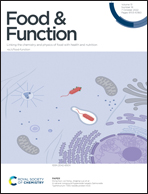Ligstroside aglycon, an extra virgin olive oil secoiridoid, prevents inflammation by regulation of MAPKs, JAK/STAT, NF-κB, Nrf2/HO-1, and NLRP3 inflammasome signaling pathways in LPS-stimulated murine peritoneal macrophages
Abstract
Ligstroside aglycon (LA) is one of the main polyphenols in extra virgin olive oil (EVOO); nevertheless, it is scarcely investigated. The aim of this study was to evaluate the immunomodulatory and anti-inflammatory effects of LA on lipopolysaccharide (LPS)-stimulated murine peritoneal macrophages, as well as the potential signaling pathways involved. Isolated macrophages were treated with LA (50, 25, and 12.5 μM) in the presence or absence of LPS (5 μg ml−1) for 18 h. Cell viability was determined using the sulforhodamine B (SRB) assay. Nitric oxide (NO) and pro-inflammatory cytokine production was analyzed by the Griess method and enzyme-linked immunosorbent assay (ELISA), respectively. Protein expression of pro-inflammatory markers and signaling pathways were evaluated by western blot analysis. LA showed significant antioxidant and anti-inflammatory effects through decreasing oxidative stress markers such as NO production, inducible nitric oxide synthase (iNOS) and NADPH oxidase-1 (NOX-1) protein expression. Besides, LA was able to reduce pro-inflammatory cytokine levels and modulate cyclo-oxygenase-2 (COX-2), and microsomal prostaglandin E synthase-1 (mPGEs-1) protein overexpression. The mechanisms underlying these protective effects could be related via activation of nuclear factor (erythroid-derived 2)-like (Nrf2)/heme oxygenase 1 (HO-1) and inhibition of nuclear factor kappa-B (NF-κB), mitogen-activated protein kinases (MAPKs), and Janus kinase/signal transducer and activation of transcription (JAK2/STAT3) signaling pathways. In addition, LA inhibited non-canonical and canonical activation of a nucleotide-binding (NOD)-like receptor (NLRP3) inflammasome. We conclude that LA showed significant antioxidant and anti-inflammatory activities in LPS-stimulated murine peritoneal macrophages. However, further in vivo studies are warranted to further investigate the bioactivity of this interesting compound that might be a promising natural agent for the treatment of immune-inflammatory diseases.



 Please wait while we load your content...
Please wait while we load your content...